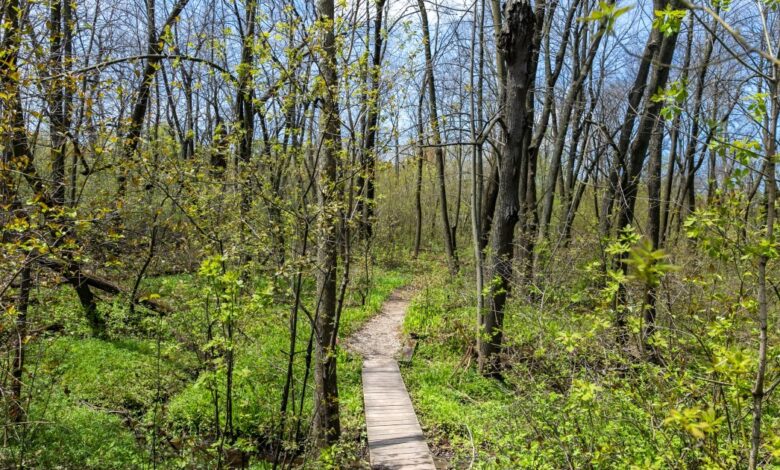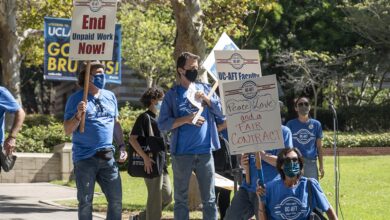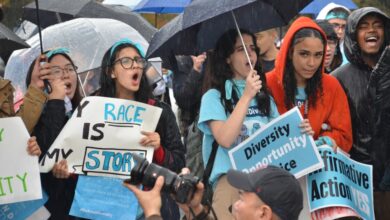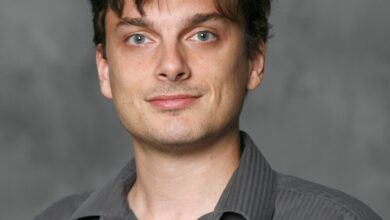A ‘Trauma Informed’ Return to Campus

The university, set a few blocks from the shore of Lake Michigan, had held some of its classes in person in the spring. So Jussel, the dean of students, already knew how to manage the public-health logistics. Now he was trying to look beneath the surface: What would a full return to campus mean?
The lives of students have changed forever.
When the university surveyed students on how they were faring last academic year, most of them said they were making it through their classes and obligations. But they didn’t feel connected — to the campus, to their professors, or to each other. Jussel summed up many students’ feelings this way: I’m hurting, but I just don’t know what to call that.
Many faculty and staff members, meanwhile, were feeling traumatized and overwhelmed.
So Jussel and a team of administrators, faculty members, and students started working on what he described as a “human centered and trauma informed” return-to-campus plan. The effort — which includes new training, meditation spaces, and guided discussions — aims to help people form meaningful connections again, take care of themselves, and process their emotions.
Jussel hopes the attentiveness to human needs will help spur a permanent shift in the campus culture.
In a grim budget climate for many colleges, it’s easy to feel like there’s little room to try new things. UW–Milwaukee is an example of how to thoughtfully — and realistically — bring students back to campus this fall.
Some of the responses have been heartbreaking, he said.
“I feel very disconnected from my peers and I haven’t really made any friends on campus,” one student wrote. “It’s just … lonely.”
Another said: “Being isolated for so long makes it extremely hard to be motivated for school.”
In a report last fall, Gronert’s group emphasized that the university needed to figure out how to address the loss of community. “Just putting the people back together wasn’t going to really work,” Gronert told The Chronicle. “The communities had been damaged in so many ways.”
A separate survey, led by Jussel and Dimitri Topitzes, a professor of social work, examined the trauma experienced by faculty members, staff members, and student employees. About 40 percent screened positive for post-traumatic stress disorder. About 70 percent had at least one PTSD symptom.
What’s more, many of UW–Milwaukee’s students have suffered hardship as a result of Covid-19: the deaths of family members or friends, extra caregiving and household obligations, and economic insecurity. Milwaukee enrolls more Black, Latino/a, and Asian students than any other campus in the University of Wisconsin system. One-third of the students are eligible for Pell Grants, nearly 40 percent are first generation, and many work one or two jobs while going to college.
I’m nervous to go back in the fall. I don’t know what to expect. I don’t even know what’s normal anymore.
One particularly vulnerable group is the rising sophomores, who spent their first year of college mostly online. They generally understood how to attend their classes, said Aaron Dierks, an academic adviser in the honors college. But they didn’t seem to know where to go if they had to fill out a specific kind of form, or if they needed a certain resource, or if they wanted to join a club. They hadn’t found their “home” on campus. That’s crucial for student retention and persistence.
“It almost felt like they had one foot in college and one foot still in high school,” said Lauren Fleck, another honors-college adviser.
Fleck recalled a recent advising appointment with a rising sophomore who was simultaneously excited and conflicted about in-person classes. He “was really anxious and kind of terrified that he would be seen as a sophomore” who knows his way around campus when, in fact, he needs the sort of guidance typically reserved for freshmen, she said.
It was clear, Jussel said, that transitioning back to campus was going to be complicated — practically and emotionally — for many people.
One student put it this way in a survey: “I’m nervous to go back in the fall. I don’t know what to expect. I don’t even know what’s normal anymore.”
But he wasn’t sure what that should look like. So in March, Jussel turned to an unusual partner: the university’s Lubar Entrepreneurship Center.
The center hosts “design thinks,” collaborative brainstorming sessions that help people try to solve big, ambiguous problems, said Nicole Powley, the center’s associate director. It was an ideal process for trying to answer Jussel’s philosophical questions.
Around 40 faculty members, staff members, and students participated in the community-focused design think. They interviewed 150 people across campus — students, custodial staff, and others — about their experiences during the pandemic. The group organized the most striking quotes around themes. Then each participant dug into what it would take to solve the issue identified in a particular quote — for instance, a student reporting that they hadn’t yet made any friends.
Emma Mae Weber, who served as student-body president last year and participated in the design think, said students were all over the map about returning to campus this fall. Many wished they’d been taking classes in person the whole year. Others wondered if they ever wanted to go back. Some remained nervous about contracting Covid-19.
“No matter how you felt, there was some form of fear,” Weber said. Across the board, she added, “the lives of students have changed forever.”
One suggestion was to develop a training session about trauma. Jussel teamed up with Topitzes, the social-work professor, and Jason Katte, assistant director of counseling services, to create a one-hour workshop on how trauma affects people, and how to react when someone shows signs of trauma. This month, they began offering the training for student-orientation leaders, as well as any interested faculty and staff members.
The sessions start out by defining trauma and explaining how prevalent it is on the Milwaukee campus, based on the recent survey data. The training then identifies tools that help people become more resilient against trauma, like social connections and mindfulness, and educates attendees on what post-traumatic growth can look like.
“We see a lot of people almost exhale because we’re validating a lot of the feelings that they have,” Jussel said. This fall, the university plans to have other opportunities, like guided discussions, for students, faculty members, and staff members to come together and process difficult experiences.
Jussel’s group also worked with academic affairs to develop a trauma-informed tool kit for professors, offering guidelines for integrating care into their teaching. “We don’t want to coddle and cater to our students to the point where we lose our mission,” said Professor Topitzes, who’s also co-founder and associate director of the university’s Institute for Child and Family Well-Being. “At the same time, we want to honor their experiences so that they can bond with the institution at the same level, if not at a deeper level.”
Beyond the trauma-education efforts, the university is designating a handful of spaces across campus for contemplation and meditation, or just getting away for a few minutes on a busy day. The goal, Topitzes said, is to transform a few existing communal spaces, like a room on the third floor of the student union, with soft lighting, comfortable seating, and resources on meditation.
Jussel’s group is also working with the campus chapter of Active Minds, a mental-health advocacy group, on a campaign promoting self care, especially for faculty and staff members. Formal meditation might not be for everyone, Jussel said, but a walk in nature might be: The campus has an 11-acre forest.
For rising sophomores, Colin Daly, the director of welcome programs, is making sure they know about resources that they might not have taken advantage of last year, like fall welcome events and peer mentoring. The honors college, meanwhile, is holding its first-ever sophomore-only orientation. The college will partner with the entrepreneurship center to get students interacting over games and team-building exercises.
“We didn’t want these students to be lost,” said Dierks, the adviser. “If we’re going to lose anyone, these are going to be the wanderers who don’t know a whole lot of what’s going on.”
Of course, UW–Milwaukee hasn’t answered all the existential questions about returning to campus. If students continue to want more academic flexibility, like hybrid classes, how will that affect their connections with the campus and one another? Will the isolation brought on by the pandemic have lasting effects?
Jussel stressed that the university’s efforts aren’t going to solve everyone’s struggles with disconnection and trauma. But he hopes their work will have an impact on how students, faculty, and staff perceive the institution.
“I hope they can say, This place cares about you,” he said.
Source link






